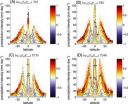(Press-News.org) CAMBRIDGE, Mass-- This could be a classic win-win solution: A system proposed by researchers at MIT recycles materials from discarded car batteries — a potential source of lead pollution — into new, long-lasting solar panels that provide emissions-free power.
The system is described in a paper in the journal Energy and Environmental Science, co-authored by professors Angela M. Belcher and Paula T. Hammond, graduate student Po-Yen Chen, and three others. It is based on a recent development in solar cells that makes use of a compound called perovskite — specifically, organolead halide perovskite — a technology that has rapidly progressed from initial experiments to a point where its efficiency is nearly competitive with that of other types of solar cells.
"It went from initial demonstrations to good efficiency in less than two years," says Belcher, the W.M. Keck Professor of Energy at MIT. Already, perovskite-based photovoltaic cells have achieved power-conversion efficiency of more than 19 percent, which is close to that of many commercial silicon-based solar cells.
Initial descriptions of the perovskite technology identified its use of lead, whose production from raw ores can produce toxic residues, as a drawback. But by using recycled lead from old car batteries, the manufacturing process can instead be used to divert toxic material from landfills and reuse it in photovoltaic panels that could go on producing power for decades.
Amazingly, because the perovskite photovoltaic material takes the form of a thin film just half a micrometer thick, the team's analysis shows that the lead from a single car battery could produce enough solar panels to provide power for 30 households.
As an added advantage, the production of perovskite solar cells is a relatively simple and benign process. "It has the advantage of being a low-temperature process, and the number of steps is reduced" compared with the manufacture of conventional solar cells, Belcher says.
Those factors will help to make it "easy to get to large scale cheaply," Chen adds.
Battery pileup ahead
One motivation for using the lead in old car batteries is that battery technology is undergoing rapid change, with new, more efficient types, such as lithium-ion batteries, swiftly taking over the market. "Once the battery technology evolves, over 200 million lead-acid batteries will potentially be retired in the United States, and that could cause a lot of environmental issues," Belcher says.
Today, she says, 90 percent of the lead recovered from the recycling of old batteries is used to produce new batteries, but over time the market for new lead-acid batteries is likely to decline, potentially leaving a large stockpile of lead with no obvious application.
In a finished solar panel, the lead-containing layer would be fully encapsulated by other materials, as many solar panels are today, limiting the risk of lead contamination of the environment. When the panels are eventually retired, the lead can simply be recycled into new solar panels.
"The process to encapsulate them will be the same as for polymer cells today," Chen says. "That technology can be easily translated."
"It is important that we consider the life cycles of the materials in large-scale energy systems," Hammond says. "And here we believe the sheer simplicity of the approach bodes well for its commercial implementation."
Old lead is as good as new
Belcher believes that the recycled perovskite solar cells will be embraced by other photovoltaics researchers, who can now fine-tune the technology for maximum efficiency. The team's work clearly demonstrates that lead recovered from old batteries is just as good for the production of perovskite solar cells as freshly produced metal.
Some companies are already gearing up for commercial production of perovskite photovoltaic panels, which could otherwise require new sources of lead. Since this could expose miners and smelters to toxic fumes, the introduction of recycling instead could provide immediate benefits, the team says.
INFORMATION:
The work, which also included research scientist Jifa Qi, graduate student Matthew Klug and postdoc Xiangnan Dang, was supported by Italian energy company Eni through the MIT Energy Initiative.
Written by David Chandler, MIT News Office
Recycling old batteries into solar cells
Proposal could divert a dangerous waste stream while producing low-cost photovoltaics
2014-08-18
ELSE PRESS RELEASES FROM THIS DATE:
Study reveals sex differences in experiencing orgasms
2014-08-18
Among single adults in the U.S., women, regardless of sexual orientation, have less predictable, more varied orgasm experiences than do men, new research indicates. The study revealed that men experience orgasm during sexual activity with a familiar partner 85% of the time on average, compared with 63% of the time for women.
The Journal of Sexual Medicine study also found that for women, but not men, the likelihood of orgasm varies with sexual orientation, with lesbian women having a significantly higher probability of orgasm than either heterosexual or bisexual women ...
Are children who play violent video games at greater risk for depression?
2014-08-18
New Rochelle, NY, August 18, 2014—While much attention has focused on the link between violent video game playing and aggression among youths, a new study finds significantly increased signs of depression among preteens with high daily exposure to violent video games. The details and implications of this important new study are described in Cyberpsychology, Behavior, and Social Networking, a peer-reviewed journal from Mary Ann Liebert, Inc., publishers. The article is available free on the Cyberpsychology, Behavior, and Social Networking website.
Susan R. Tortolero, ...
Smoking during pregnancy may affect grandchildren's growth
2014-08-18
A UK study published in the American Journal of Human Biology has found that smoking during pregnancy has discernible effects on the growth of a woman's future grandkids.
With non-smoking mothers, if a paternal grandmother smoked during pregnancy, her granddaughters tended to be taller and both her granddaughters and grandsons tended to have greater bone mass and lean (muscle) mass. If a maternal grandmother smoked during pregnancy, her grandsons became heavier than expected during adolescence, with increased lean mass, grip strength and cardiovascular fitness. When ...
Ebola has profound effects on wildlife population dynamics
2014-08-18
New research in gorillas that were affected by an Ebola virus outbreak shows that disease can influence reproductive potential, immigration and social dynamics, and it highlights the need to develop complex models that integrate all the different impacts of a disease.
This approach requires long-term monitoring of wildlife populations to understand the responses of populations to emerging changes in the environment, according to the Journal of Animal Ecology study.
"Along with the decrease in survival and in reproduction, Ebola outbreak perturbed social dynamics in ...
Pigs' hearts transplanted into baboon hosts remain viable more than a year
2014-08-18
Beverly, MA, August 18, 2014 – Investigators from the National Heart, Lung, and Blood Institute (NHLBI) of the National Institutes of Health (NIH) have successfully transplanted hearts from genetically engineered piglets into baboons' abdomens and had the hearts survive for more than one year, twice as long as previously reported. This was achieved by using genetically engineered porcine donors and a more focused immunosuppression regimen in the baboon recipients, according to a study published in The Journal of Thoracic and Cardiovascular Surgery, an official publication ...
Ocean warming could drive heavy rain bands toward the poles
2014-08-18
In a world warmed by rising atmospheric greenhouse gas concentrations, precipitation patterns are going to change because of two factors: one, warmer air can hold more water; and two, changing atmospheric circulation patterns will shift where rain falls. According to previous model research, mid- to high-latitude precipitation is expected to increase by as much as 50%. Yet the reasons why models predict this are hard to tease out.
Using a series of highly idealized model runs, Lu et al. found that ocean warming should cause atmospheric precipitation bands to shift toward ...
New mouse model points to therapy for liver disease
2014-08-18
Non-alcoholic fatty liver disease (NAFLD) is a common affliction, affecting almost 30 percent of Americans, with a significant number suffering from its most severe form, called non-alcoholic steatohepatitis or NASH, which can lead to cirrhosis and liver cancer. In recent years, NASH has become the leading cause of liver transplantation.
Development of effective new therapies for preventing or treating NASH has been stymied by limited small animal models for the disease. In a paper published online in Cancer Cell, scientists at the University of California, San Diego ...
Blood pressure medication does not cause more falls
2014-08-18
It's time to question the common belief that patients receiving intensive blood pressure treatment are prone to falling and breaking bones. A comprehensive study in people ages 40 to 79 with diabetes, led by Karen Margolis, MD, of HealthPartners Institute for Education and Research in the US, found no evidence supporting this belief. The study¹ appears in the Journal of General Internal Medicine², published by Springer.
Evidence from various clinical trials shows that cardiovascular events such as strokes can be prevented by treating high blood pressure (hypertension). ...
Study: World's primary forests on the brink
2014-08-18
August 18, 2014: An international team of conservationist scientists and practitioners has published new research showing the precarious state of the world's primary forests.
The global analysis and map are featured in a paper appearing in the esteemed journal Conservation Letters and reveals that only five percent of the world's pre-agricultural primary forest cover is now found in protected areas.
Led by Professor Brendan Mackey, Director of the Climate Change Response Program at Griffith University in Queensland, Australia, the authors are experts in forest ecology, ...
Study reveals immune system is dazed and confused during spaceflight
2014-08-18
There is nothing like a head cold to make us feel a little dazed. We get things like colds and the flu because of changes in our immune system. Researchers have a good idea what causes immune system changes on Earth—think stress, inadequate sleep and improper nutrition. But the results of two NASA collaborative investigations—Validation of Procedures for Monitoring Crewmember Immune Function (Integrated Immune) and Clinical Nutrition Assessment of ISS Astronauts, SMO-016E (Clinical Nutrition Assessment)—recently published in the Journal of Interferon & Cytokine Research ...
LAST 30 PRESS RELEASES:
New way to find “aged” cells marks fresh approach for research into ageing
From blood sugar to brain relief: GLP-1 therapy slashes migraine frequency
Variability in heart rate during sleep may reveal early signs of stroke, depression or cognitive dysfunction, new study shows
New method to study catalysts could lead to better batteries
Current Molecular Pharmacology impact factor rises to 2.9, achieving Q2 ranking in the Pharmacology & Pharmacy category in 2024 JCR
More time with loved ones for cancer patients spared radiation treatment
New methods speed diagnosis of rare genetic disease
Genetics of cardiomyopathy risk in cancer survivors differ by age of onset
Autism inpatient collection releases genetic, phenotypic data for more than 1,500 children with autism
Targeting fusion protein’s role in childhood leukemia produces striking results
Clear understanding of social connections propels strivers up the social ladder
New research reveals why acute and chronic pain are so different – and what might make pain last
Stable cooling fostered life, rapid warming brought death: scientists use high-resolution fusuline data reveal evolutionary responses to cooling and warming
New research casts doubt on ancient drying of northern Africa’s climate
Study identifies umbilical cord blood biomarkers of early onset sepsis in preterm newborns
AI development: seeking consistency in logical structures
Want better sleep for your tween? Start with their screens
Cancer burden in neighborhoods with greater racial diversity and environmental burden
Alzheimer disease in breast cancer survivors
New method revolutionizes beta-blocker production process
Mechanism behind life-threatening cancer drug side-effect revealed
Weighted vests might help older adults meet weight loss goals, but solution for corresponding bone loss still elusive
Scientists find new way to predict how bowel cancer drugs will stop working – paving the way for smarter treatments
Breast cancer patients’ microbiome may hold key to avoiding damaging heart side-effects of cancer therapies
Exercise-induced protein revives aging muscles and bones
American College of Cardiology issues guidance on weight management drugs
Understanding the effect of bedding on thermal insulation during sleep
Cosmic signal from the very early universe will help astronomers detect the first stars
With AI, researchers find increasing immune evasion in H5N1
Study finds hidden effects of wildfires on water systems
[Press-News.org] Recycling old batteries into solar cellsProposal could divert a dangerous waste stream while producing low-cost photovoltaics




